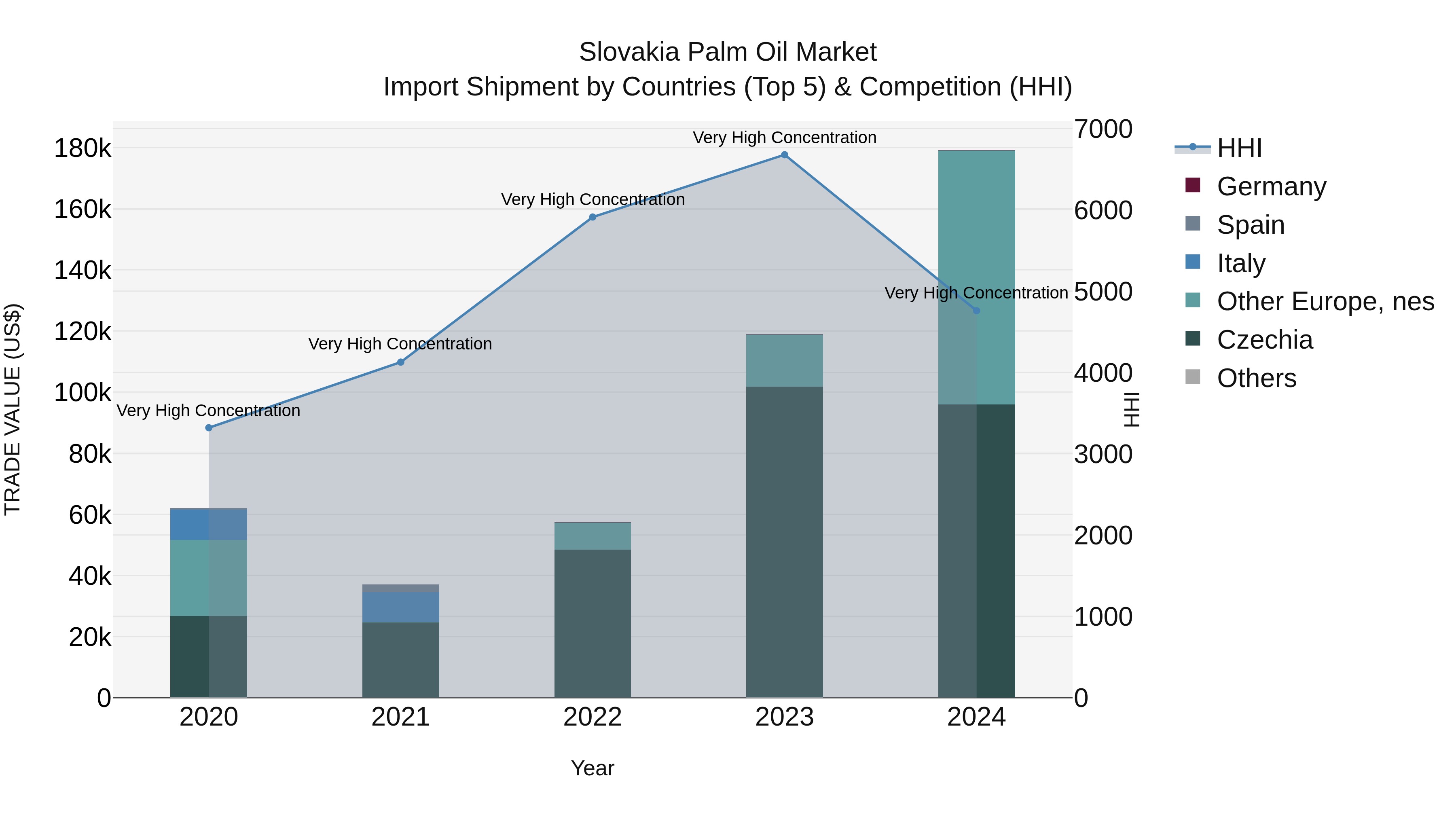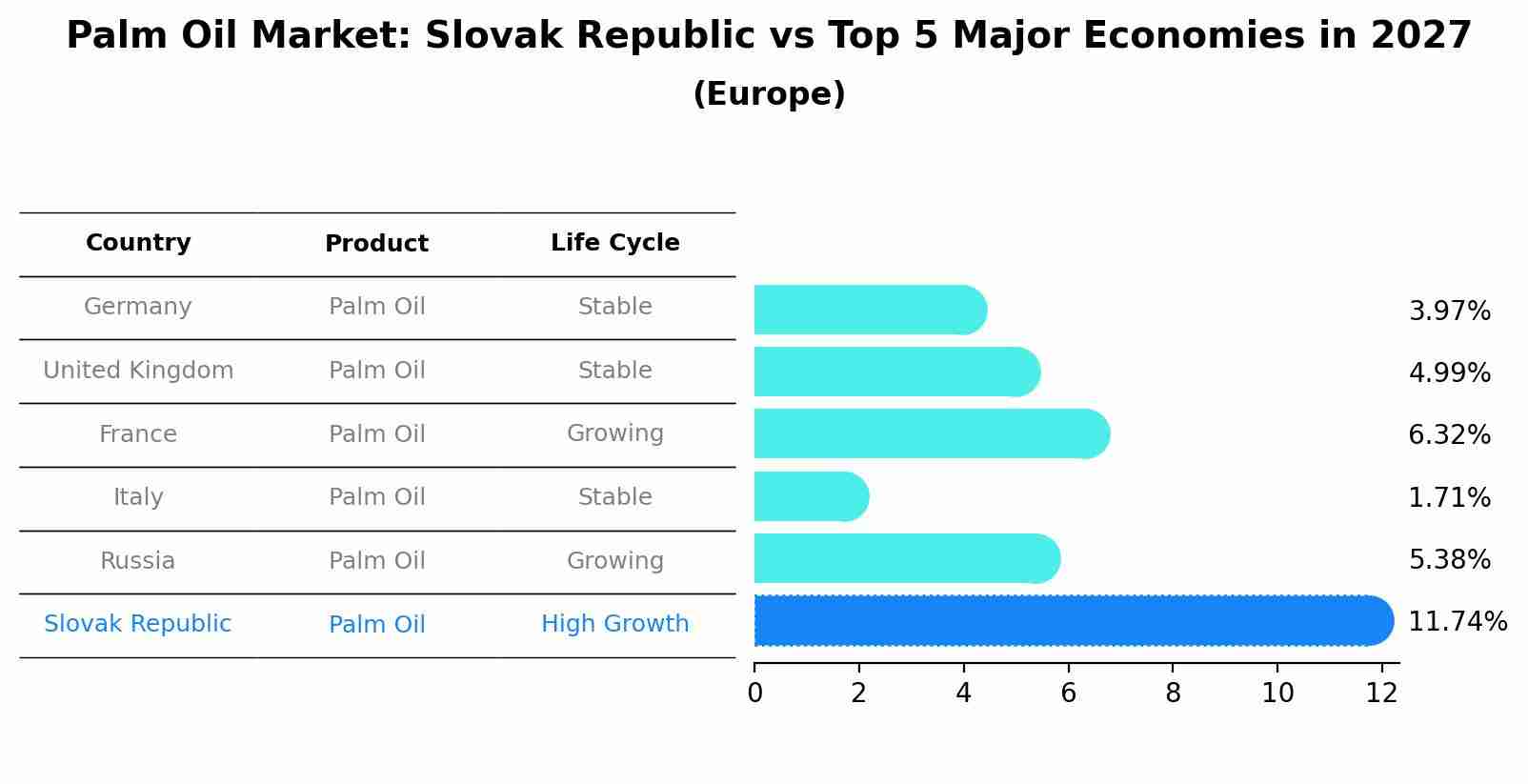Slovakia Palm Oil Market Outlook | Industry, Analysis, Growth, Share, Revenue, Value, Trends, Size, Forecast, COVID-19 IMPACT & Companies
| Product Code: ETC383780 | Publication Date: Aug 2022 | Updated Date: Nov 2025 | Product Type: Market Research Report | |
| Publisher: 6Wresearch | Author: Ravi Bhandari | No. of Pages: 75 | No. of Figures: 35 | No. of Tables: 20 |
Slovakia Palm Oil Market Top 5 Importing Countries and Market Competition (HHI) Analysis
Slovakia`s palm oil import shipments in 2024 continued to show strong growth, with a notable CAGR of 30.31% from 2020 to 2024. The top exporting countries to Slovakia include Czechia, Germany, Indonesia, and the UK, reflecting diversified sources. However, the Market Top 5 Importing Countries and Market Competition (HHI) Analysis remains highly concentrated, as indicated by the high HHI in 2024. The impressive growth rate of 50.6% from 2023 to 2024 suggests a robust demand for palm oil in Slovakia, emphasizing the country`s reliance on these imports for various industries.

Palm Oil Market: Slovak Republic vs Top 5 Major Economies in 2027 (Europe)
In the Europe region, the Palm Oil market in Slovak Republic is projected to expand at a high growth rate of 11.74% by 2027. The largest economy is Germany, followed by United Kingdom, France, Italy and Russia.

Slovakia Palm Oil Market Synopsis
The Slovakia Palm Oil Market is relatively small compared to other European countries, with consumption primarily driven by the food industry for products such as margarine, confectionery, and baked goods. The market is facing increasing scrutiny due to environmental and ethical concerns surrounding palm oil production, leading to a growing demand for sustainable and certified palm oil products. Slovakia imports the majority of its palm oil, primarily from countries like Indonesia and Malaysia. The government is taking steps to promote sustainable sourcing practices and raise awareness among consumers about the importance of choosing responsibly sourced palm oil products. Overall, the Slovakia Palm Oil Market is evolving towards more sustainable practices in line with global trends towards ethical and environmentally friendly products.
Slovakia Palm Oil Market Trends
In Slovakia, the palm oil market is witnessing a growing trend towards sustainable and ethically sourced palm oil products. Consumers are becoming increasingly aware of the environmental and social impacts of palm oil production, leading to a higher demand for certified sustainable palm oil. This trend is driven by concerns about deforestation, wildlife habitat destruction, and human rights violations associated with conventional palm oil cultivation. Food companies and retailers in Slovakia are responding to this consumer demand by committing to sourcing sustainable palm oil and obtaining certifications such as RSPO (Roundtable on Sustainable Palm Oil). Additionally, there is a rising interest in alternative plant-based oils as consumers seek healthier and more environmentally friendly options, leading to the introduction of products with alternative oil sources in the market.
Slovakia Palm Oil Market Challenges
The Slovakia Palm Oil Market faces several challenges, including consumer awareness and perception of the environmental and ethical implications of palm oil production. There is a growing demand for sustainable and responsibly sourced palm oil products in Slovakia, leading to pressure on companies to adopt transparent supply chain practices. Additionally, regulatory issues and restrictions on palm oil imports in the European Union present obstacles for businesses operating in the Slovak market. The competition from alternative oils and substitutes further complicates the market landscape, as consumers are increasingly seeking healthier and more environmentally friendly options. Overall, navigating these challenges requires companies to adapt their strategies to meet consumer preferences and comply with evolving regulations in order to succeed in the Slovakia Palm Oil Market.
Slovakia Palm Oil Market Investment Opportunities
The Slovakia Palm Oil Market offers potential investment opportunities in several areas. One option is investing in sustainable palm oil production practices to meet the growing demand for eco-friendly products. Another opportunity lies in the development of innovative technologies for palm oil cultivation and processing, such as automation and precision agriculture. Additionally, investing in research and development to enhance the efficiency and sustainability of palm oil production can be lucrative. Furthermore, there is potential in the downstream sector for investments in the manufacturing of palm oil-based products like biofuels, cosmetics, and food ingredients. Overall, the Slovakia Palm Oil Market presents diverse investment prospects for those looking to capitalize on the demand for palm oil and its derivatives while promoting sustainability and innovation.
Jordan Agar Market Government Policies
The Slovakia government has not implemented specific policies directly targeting the palm oil market. However, Slovakia is a member of the European Union (EU), which has regulations in place regarding the import and use of palm oil. The EU has set sustainability criteria for biofuels, including palm oil, to ensure they are produced in an environmentally sustainable manner. Additionally, the EU has been working towards reducing the use of palm oil in food products due to concerns about deforestation and environmental impact. Slovakia, as an EU member state, is expected to comply with these regulations and policies set at the EU level, which can impact the palm oil market within the country.
Slovakia Palm Oil Market Future Outlook
The future outlook for the Slovakia Palm Oil Market appears promising, driven by increasing consumer demand for palm oil in various industries such as food, cosmetics, and biofuels. However, there are challenges ahead, including growing concerns about the environmental impact of palm oil production, leading to a shift towards sustainable sourcing practices. This trend is likely to continue, with consumers and regulators placing more emphasis on sustainable and ethical production methods. Additionally, the government`s policies and regulations regarding palm oil imports and usage may impact the market dynamics in the coming years. Overall, the Slovakia Palm Oil Market is expected to see steady growth, albeit with a focus on sustainability and responsible sourcing practices to meet changing consumer preferences and regulatory requirements.
Key Highlights of the Report:
- Slovakia Palm Oil Market Outlook
- Market Size of Slovakia Palm Oil Market, 2021
- Forecast of Slovakia Palm Oil Market, 2031
- Historical Data and Forecast of Slovakia Palm Oil Revenues & Volume for the Period 2018 - 2031
- Slovakia Palm Oil Market Trend Evolution
- Slovakia Palm Oil Market Drivers and Challenges
- Slovakia Palm Oil Price Trends
- Slovakia Palm Oil Porter's Five Forces
- Slovakia Palm Oil Industry Life Cycle
- Historical Data and Forecast of Slovakia Palm Oil Market Revenues & Volume By Nature for the Period 2018 - 2031
- Historical Data and Forecast of Slovakia Palm Oil Market Revenues & Volume By Organic for the Period 2018 - 2031
- Historical Data and Forecast of Slovakia Palm Oil Market Revenues & Volume By Conventional for the Period 2018 - 2031
- Historical Data and Forecast of Slovakia Palm Oil Market Revenues & Volume By Product for the Period 2018 - 2031
- Historical Data and Forecast of Slovakia Palm Oil Market Revenues & Volume By CPO for the Period 2018 - 2031
- Historical Data and Forecast of Slovakia Palm Oil Market Revenues & Volume By RBD Palm Oil for the Period 2018 - 2031
- Historical Data and Forecast of Slovakia Palm Oil Market Revenues & Volume By Palm Kernel Oil for the Period 2018 - 2031
- Historical Data and Forecast of Slovakia Palm Oil Market Revenues & Volume By Fractionated Palm Oil for the Period 2018 - 2031
- Historical Data and Forecast of Slovakia Palm Oil Market Revenues & Volume By End-use for the Period 2018 - 2031
- Historical Data and Forecast of Slovakia Palm Oil Market Revenues & Volume By Food & Beverage for the Period 2018 - 2031
- Historical Data and Forecast of Slovakia Palm Oil Market Revenues & Volume By Personal Care & Cosmetics for the Period 2018 - 2031
- Historical Data and Forecast of Slovakia Palm Oil Market Revenues & Volume By Biofuel & Energy for the Period 2018 - 2031
- Historical Data and Forecast of Slovakia Palm Oil Market Revenues & Volume By Pharmaceuticals for the Period 2018 - 2031
- Historical Data and Forecast of Slovakia Palm Oil Market Revenues & Volume By Others for the Period 2018 - 2031
- Slovakia Palm Oil Import Export Trade Statistics
- Market Opportunity Assessment By Nature
- Market Opportunity Assessment By Product
- Market Opportunity Assessment By End-use
- Slovakia Palm Oil Top Companies Market Share
- Slovakia Palm Oil Competitive Benchmarking By Technical and Operational Parameters
- Slovakia Palm Oil Company Profiles
- Slovakia Palm Oil Key Strategic Recommendations
Frequently Asked Questions About the Market Study (FAQs):
- Single User License$ 1,995
- Department License$ 2,400
- Site License$ 3,120
- Global License$ 3,795
Search
Thought Leadership and Analyst Meet
Our Clients
Related Reports
- Afghanistan Rocking Chairs And Adirondack Chairs Market (2026-2032) | Size & Revenue, Competitive Landscape, Share, Segmentation, Industry, Value, Outlook, Analysis, Trends, Growth, Forecast, Companies
- Afghanistan Apparel Market (2026-2032) | Growth, Outlook, Industry, Segmentation, Forecast, Size, Companies, Trends, Value, Share, Analysis & Revenue
- Canada Oil and Gas Market (2026-2032) | Share, Segmentation, Value, Industry, Trends, Forecast, Analysis, Size & Revenue, Growth, Competitive Landscape, Outlook, Companies
- Germany Breakfast Food Market (2026-2032) | Industry, Share, Growth, Size, Companies, Value, Analysis, Revenue, Trends, Forecast & Outlook
- Australia Briquette Market (2025-2031) | Growth, Size, Revenue, Forecast, Analysis, Trends, Value, Share, Industry & Companies
- Vietnam System Integrator Market (2025-2031) | Size, Companies, Analysis, Industry, Value, Forecast, Growth, Trends, Revenue & Share
- ASEAN and Thailand Brain Health Supplements Market (2025-2031) | Strategy, Consumer Insights, Analysis, Investment Trends, Opportunities, Growth, Size, Share, Industry, Revenue, Segments, Value, Segmentation, Supply, Forecast, Restraints, Outlook, Competition, Drivers, Trends, Demand, Pricing Analysis, Competitive, Strategic Insights, Companies, Challenges
- ASEAN Bearings Market (2025-2031) | Strategy, Consumer Insights, Analysis, Investment Trends, Opportunities, Growth, Size, Share, Industry, Revenue, Segments, Value, Segmentation, Supply, Forecast, Restraints, Outlook, Competition, Drivers, Trends, Demand, Pricing Analysis, Competitive, Strategic Insights, Companies, Challenges
- Europe Flooring Market (2025-2031) | Outlook, Share, Industry, Trends, Forecast, Companies, Revenue, Size, Analysis, Growth & Value
- Saudi Arabia Manlift Market (2025-2031) | Outlook, Size, Growth, Trends, Companies, Industry, Revenue, Value, Share, Forecast & Analysis
Industry Events and Analyst Meet
Whitepaper
- Middle East & Africa Commercial Security Market Click here to view more.
- Middle East & Africa Fire Safety Systems & Equipment Market Click here to view more.
- GCC Drone Market Click here to view more.
- Middle East Lighting Fixture Market Click here to view more.
- GCC Physical & Perimeter Security Market Click here to view more.
6WResearch In News
- Doha a strategic location for EV manufacturing hub: IPA Qatar
- Demand for luxury TVs surging in the GCC, says Samsung
- Empowering Growth: The Thriving Journey of Bangladesh’s Cable Industry
- Demand for luxury TVs surging in the GCC, says Samsung
- Video call with a traditional healer? Once unthinkable, it’s now common in South Africa
- Intelligent Buildings To Smooth GCC’s Path To Net Zero


















